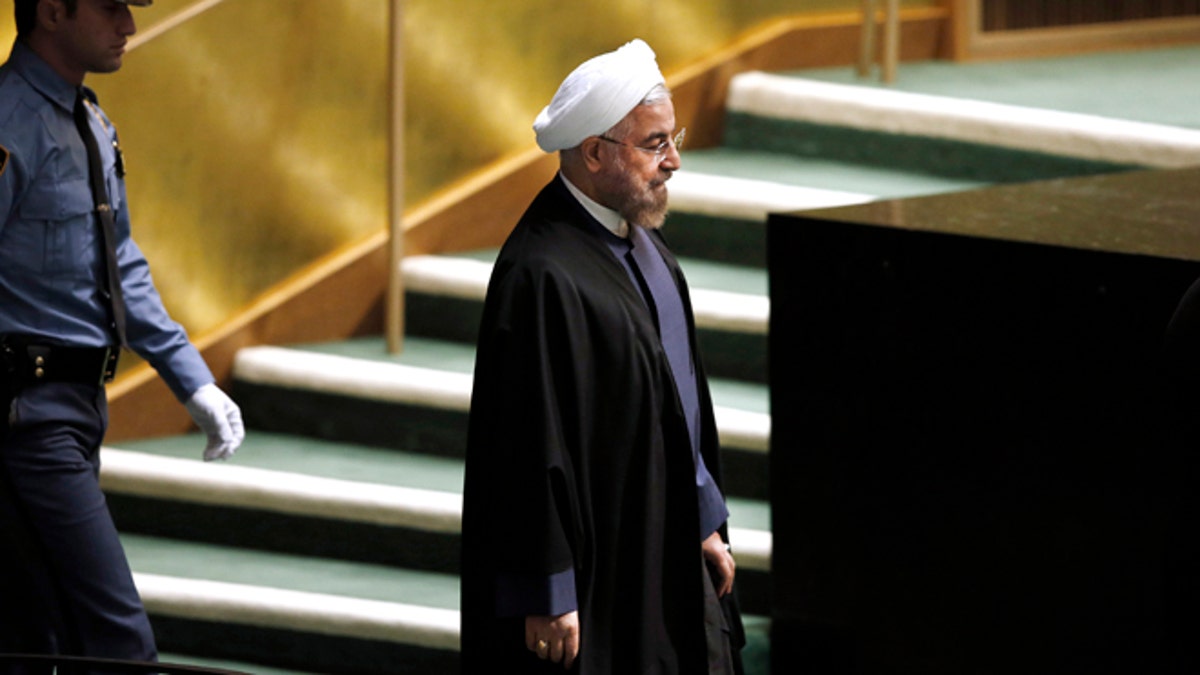
In this Thursday, Sept. 25, 2014 photo, President Hassan Rouhani of Iran walks in before addressing the 69th session of the United Nations General Assembly at U.N. headquarters. (AP)
Iranian President Hassan Rouhani on Thursday sought to leverage the crisis in the Middle East to ease sanctions on his country as part of nuclear talks, suggesting during a United Nations address that security cooperation between Iran and other nations could only occur if they struck a favorable nuclear deal.
The Iranian president, meanwhile, sought to lay the blame for raging violence in the Middle East at the feet of western nations. He strongly condemned terrorism and described it as a serious threat, but also said the West’s “blunders” in the region have created a “haven for terrorists and extremists.” He alleged that attempts to “export” democracy have created “weak and vulnerable governments.”
While focusing in large part on violent extremists in the region, Rouhani made clear Iran’s cooperation in addressing these threats hinges on the outcome of ongoing nuclear talks – as he once again urged other nations to drop what he described as “excessive demands.”
Rouhani said a deal could mark the “beginning of multilateral cooperation” and allow for “greater focus on some very important regional issues such as combating violence and extremism.”
But, he said: “The people of Iran who have been subjected to pressures … as a result of continued sanctions cannot place trust in any security cooperation between their governments with those who have imposed sanctions.”
Whether Iran’s cooperation in addressing Middle East unrest will serve as an effective bargaining chip remains to be seen.
The U.S. publicly has said it will not cooperate militarily or share intelligence with Iran to address the Islamic State threat.
Yet Secretary of State John Kerry said this week he was "open to have a conversation at some point in time if there's a way to find something constructive." And the U.S. reportedly notified Iran in advance of plans to strike inside Syria.
In his address to world leaders late Wednesday, British Prime Minister David Cameron also said Iran could help in defeating the terror group's threat. Cameron spoke hours after meeting in person with Rouhani, the first meeting between the British and Iranian leaders since the Iranian revolution in 1979.
The world leaders spoke as the U.S., Iran and other nations resume nuclear talks after a two-month hiatus.
They are running up against a Nov. 24 deadline to reach a comprehensive agreement to curb Iran’s nuclear activities in exchange for easing sanctions.
Tehran, though, is resisting U.S. calls that it gut a nuclear program that enriches uranium, a process that can make both reactor fuel and the fissile core of a nuclear warhead. GOP lawmakers have also warned that the Obama administration may be willing to give too much ground to Iran in pursuit of an agreement.
Failure to seal a deal could see a return to confrontation, including U.S. and Israeli threats of military means as a last resort to slow Iran's nuclear program.
"My message to Iran's leaders and people is simple: Do not let this opportunity pass," President Obama said Wednesday in his own address to world leaders.
The disagreement has complicated efforts to regarding the Islamic State menace.
In comments on the eve of his own General Assembly speech, Rouhani suggested his country was ready to join Washington and others in opposing the Islamic State. But he said the U.S. needed to move beyond "insignificant" fears that his country seeks nuclear arms.
At the same time, he was critical of the U.S. bombing campaign of Islamic State group strongholds and the growing coalition of countries seeking to stop the extremists by military means. "Bombing and airstrikes are not the appropriate way," Rouhani said, warning that "extraterritorial interference ... in fact only feeds and strengthens terrorism."
There are other issues. American officials are furious with Iran for detaining Jason Rezarian, a Washington Post journalist who has both American and Iranian citizenship, as well as his wife.
Iranian officials have not specifically said why the couple is being held, and Rouhani has dodged questions about their fate. Asked again Wednesday about Rezarian, he said he would be freed if he is innocent of any crime.
The Associated Press contributed to this report.




